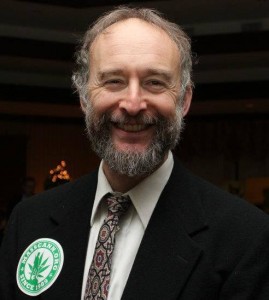

Dr. Mitch is an accomplished researcher and speaker and has been an invaluable asset to the cannabis community. He is a Professor of Psychology at the State University of New York at Albany who received his bachelor’s degree from Columbia University and his doctorate from Indiana University.
He speaks all over the country, spreading the word about cannabis and the amazing things it can do.
He has over 100 publications in scientific journals on addictions and is the author of several books, including “Understanding Marijuana: A New Look at the Scientific Evidence”, “Pot Politics: Marijuana and the Costs of Prohibition” and “Parents’ Guide to Marijuana”. Dr. Mitch is also the host of Burning Issues, a podcast where he interviews those in the cannabis industry and community on a wide variety of topics.
I recently got a chance to pick Dr. Mitch’s brain and ask him about his life, the cannabis community and how he uses humor to get his message across.
The Marijuana Times: What were you told about cannabis growing up?
Dr. Mitch Earleywine: My 6th grade teacher had a picture of flowers on the wall that said, “When Flower Children go to pot, they become BLOOMING IDIOTS”. We got the standard self-esteem building programs back then, because everyone thought that kids turned to drugs because of low self-esteem. The program essentially made people think that they were so great that they would never develop any drug problems.
MT: How did you get involved in alcohol research?
ME: My friend Chris Martin and I were hanging out in grad school trying to do some good work. We pitched some ideas to each other and finally thought that an alcohol study would be interesting and have potential. It was the 1980s in Indiana, right after one of the big bike races. Drinking around the “Little 500” (as opposed to the Indy 500) was so high that reviewers of the first paper we wrote thought we had moved our decimal point inadvertently.
MT: What got you interested in cannabis as a research subject?
ME: I’d always thought it was interesting but feared it would be too controversial before I got tenure. Once I got tenure, I pulled out the stops. I’m sure I missed some awards and honors and invitations because my work has been so contentious, but at least I’m not bored.
MT: What were some of the misconceptions about cannabis that you may have had going into your research?
ME: I always thought the respiratory irritation and lung cancer risk was large and meaningful. Once Tashkin and the crew out at UCLA started publishing results showing no increase in lung cancer, I realized I’d been duped. I still love the vaporizer research and encourage folks to use the gizmos, but it’s for avoiding bronchitis symptoms, not lung cancer.
MT: Are you surprised about the recent success of the cannabis law reform movement?
ME: I’ve never had a crystal ball. I thought we’d change federal law and prohibition would come crashing down in one big swoop. I never thought individual states would go rogue. It’s been delightful to watch.
MT: If people want to do more research on cannabis, where should they start?
ME: Just follow your bliss. Get a good feel for what’s already been done. (Check out google scholar or any university resources.) Try to replicate and extend previous work. Pay attention in the statistics and methodology classes and you’re bound to do some good work.
MT: You’ve been getting into stand-up comedy lately, how has that been going?
ME: I used to play The Comedy Store and Ice House in Los Angeles back in the late 90s. I just wanted to see if I still had the touch. I had a couple good shows at The Comedy Works here in Albany. A cop pulled me aside after the first show to try to explain how a cannabis bust helped him get someone treatment for prescription drug addiction. I’d obviously struck a nerve.
MT: How has humor shaped your ability to talk about cannabis with younger people?
ME: I have literally 20+ teaching awards and it’s all because of humor. Even people who think cannabis is the most interesting plant on earth start to go comatose when I’m ranting about effect sizes and causality. If I couldn’t lighten it up, I doubt my classes would be very large.
MT: Do you have any projects coming up that you want people to know about?
ME: We’re just wrapping up analyses on some data addressing cannabis and premenstrual syndrome. It’s going to be an uphill battle to publish because both marijuana and PMS are so controversial. In a nutshell, though, it looks like the plant has a lot of potential to help.
The cannabis law reform community comprises many different people that come from many different walks of life; in fact, its diversity is one of the reasons for its success. If everyone who used cannabis was just some unemployed stoner sitting on his mother’s couch, very few people would care. But, because activists and patients look like you or maybe someone you know, the issue is more relatable.
While each person in the movement has their place, people like Dr. Mitch are invaluable to the movement. Someone who is highly educated, yet can explain the more intricate and complicated issues surrounding the cannabis plant in a way that anyone can understand is a huge asset; someone with the gravitas of a doctor and the communication skills of a comedian.
Simply put, the movement needs more people like Dr. Mitch. In fact, we can never have enough. The experience of older generations has to be passed down to younger generations, and when it comes to cannabis legalization, the younger generations are the ones who are going to make it happen. But they need the truth and science behind what they are fighting for.
One day we will all look back at cannabis prohibition as a long, inexplicable experiment that continued despite a mountain of evidence that it not only didn’t work, but in fact, did irreparable harm to society as a whole.
There will also be a group of people we look back on who were on the front lines, spreading the information and the truth needed to bring down the walls of prohibition and end the suffering of so many people. The legends of the movement.
One of those legends is Dr. Mitch Earleywine.

No comments:
Post a Comment